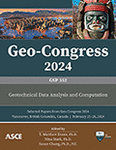Application of Ensemble-Based Methods for Prediction of Undrained Shear Strength of Soft Sensitive Clays
Publication: Geo-Congress 2024
ABSTRACT
Owing to recent advancements in artificial intelligence, the technology has gained popularity across all possible domains in geotechnical engineering over the past few decades. The present study demonstrates the application of machine learning techniques to predict the undrained shear strength of soft, sensitive clay. Field and laboratory measurements from 24 test locations in Finland are used to create a multivariate database consisting of 384 data points. The main objective of the study is to predict the undrained shear strength using ensemble-based machine learning models, viz., random forest, gradient boosting, extreme gradient boosting, AdaBoost, and light gradient boosting. The undrained shear strength of the clay soil sample is considered as an output parameter for given input features that include pre-consolidation stress, vertical effective stress, liquid limit, plastic limit, and water content. The results from the ensemble-based machine learning models are compared with those from the base models like decision trees. Results show that the ensemble-based extreme gradient boost and light gradient boost models outperform the base models in terms of accuracy and error with the extreme gradient boost model showing the highest coefficient of determination and root mean squared error (indicators of a good prediction model). Furthermore, sensitivity analysis is carried out for the best-performing extreme gradient boosting model, and results show that undrained shear strength is highly influenced by pre-consolidation stress, the existing vertical effective stress, and the plasticity index of the soil.
Get full access to this article
View all available purchase options and get full access to this chapter.
REFERENCES
Breiman, L. (2001). “Random forests”. Machine learning, 45, pp.5–32.
Chen, T., He, T., Benesty, M., Khotilovich, V., Tang, Y., Cho, H., Chen, K., Mitchell, R., Cano, I., and Zhou, T. (2015). “Xgboost: extreme gradient boosting”., 1(4), pp.1-4.
Ching, J., and Phoon, K. K. (2018). “Constructing site-specific multivariate probability distribution model using Bayesian machine learning”. J. Eng. Mech. 145 (1), 04018126.
D’Ignazio, M., Phoon, K. K., Tan, S. A., and Lansivaara, T. T. (2016). “Correlations for undrained shear strength of Finnish soft clays.” Can. Geotech. J. 53 (10), 1628–1645.
Freund, Y., and Mason, L. (1999). “The alternating decision tree learning algorithm.” In icml (Vol. 99, pp. 124–133).
Friedman, J. H. (2001). “Greedy function approximation: a gradient boosting machine.” Annals of Statistics, pp.1189–1232.
Ho, L. S., and Tran, V. Q. (2022). “Machine learning approach for predicting and evaluating California bearing ratio of stabilized soil containing industrial waste.” Journal of Cleaner Production, 370, p.133587.
Ikeagwuani, C. C., Nwonu, D. C., and Nweke, C. C. (2022). “Resilient modulus descriptive analysis and estimation for fine-grained soils using multivariate and machine learning methods”. International Journal of Pavement Engineering, 23(10), pp. 3409–3424.
Jamiolkowski, M. (1985). “New developments in field and laboratory testing of soils”. In: Proceedings of the 11th International Conference on Soil Mechanics and Foundation Engineering, vol. 1. San Francisco, pp. 57–153.
Ladd, C. C., Foott, R., Ishihara, K., and Schlosser, F. (1977). Stress-deformation and strength characteristics.
Mesri, G. (1975). “New design procedure for the stability of soft clays.” J. Geotech. Geoenviron. Eng. 101 (4), 409–412.
Pal, M., and Deswal, S. (2014). “Extreme learning machine-based modeling of resilient modulus of subgrade soils”. Geotechnical and Geological Engineering, 32, pp.287–296.
Skempton, A. W. (1957). ‘Discussion on the planning and design of the new Hong Kong airport’, in Proceedings of the institution of civil engineers.
Taha, A. A., and Malebary, S. J. (2020). “An intelligent approach to credit card fraud detection using an optimized light gradient boosting machine”. IEEE Access, 8, pp.25579–25587.
Webb, G. I. (2000). “Multiboosting: A technique for combining boosting and wagging”. Machine learning, 40(2), p.159.
Zhang, W., Wu, C., Zhong, H., Li, Y., and Wang, L. (2021). “Prediction of undrained shear strength using extreme gradient boosting and random forest based on Bayesian optimization”. Geoscience Frontiers, 12(1), pp.469–477.
Information & Authors
Information
Published In
History
Published online: Feb 22, 2024
ASCE Technical Topics:
- Artificial intelligence and machine learning
- Clays
- Computer programming
- Computing in civil engineering
- Effective stress
- Engineering fundamentals
- Engineering mechanics
- Errors (statistics)
- Geomechanics
- Geotechnical engineering
- Material mechanics
- Material properties
- Materials engineering
- Mathematics
- Model accuracy
- Models (by type)
- Shear strength
- Soil mechanics
- Soil properties
- Soil strength
- Soils (by type)
- Static loads
- Statics (mechanics)
- Statistics
- Strength of materials
- Stress (by type)
- Structural analysis
- Structural engineering
- Vertical loads
Authors
Metrics & Citations
Metrics
Citations
Download citation
If you have the appropriate software installed, you can download article citation data to the citation manager of your choice. Simply select your manager software from the list below and click Download.
